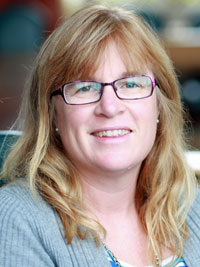Professor Anna Vignoles is an economist working in the Faculty of Education at the University of Cambridge and her research on widening participation in higher education, on social mobility, the impact of school resources on pupil achievement and on the socio-economic gap in pupil achievement has been widely published by organisations including the IFS (Institute for Fiscal Studies). She is a Nuffield Foundation Trustee and has advised numerous Government departments, including the Department for Education and HM Treasury. Anna is an associate editor for The Cambridge Journal of Education and Education Economics, as well as being a member of the ESRC (Economic and Social Research Council) Research Committee and a member of the Advisory Board of the Sutton Trust.

“…the gulf in the material experience between the child of an unemployed worker in the North compared to the child of a high paid worker in the South is just so huge. Understanding how education can help bridge that gap seems to me to be a crucially important thing to spend time researching…”
Becoming an economist to help societies manage scarcity
I studied economics at A-level and I knew then that this was what I wanted to study at university. Even now the understanding that economics gives you about the way societies manage scarcity still fascinates me. I was particularly fortunate that my undergraduate studies at the University of London enabled me to study a very wide range of incredibly interesting topics, from Marxism and the study of Middle Eastern oil economies at the School of Oriental and African Studies, through to labour and environmental economics at UCL [University College London].

I then entered the labour market in the middle of a difficult period of recession at the beginning of the 1990s and after a few years working in human resources, I ended up in a great job recruiting shop floor workers for a factory in South Tyneside. The work really sparked my interest in labour markets and how they operate and particularly the importance of skills.
When a Ph.D opportunity came up at Newcastle University to study labour markets, I jumped at it. I had an amazing supervisor, Professor Peter Dolton, who really guided me and set me on my academic path and after my Ph.D I secured a fellowship at the London School of Economics [LSE], where I spent many happy years.
Focusing on labour economics
Over time my interest in the education side of labour economics took over my research agenda, and in 2002 I joined the Institute of Education as an education economist. The IOE was growing rapidly at that time and we soon had a vibrant department full of quantitative social scientists, a large proportion of whom were education economists.
It was during this time that I secured my Chair in the Economics of Education. Then, four years ago, I joined the Faculty of Education here at Cambridge and since then I have been having a fabulous time working with a range of different people. What is perhaps most exciting is the opportunity for interdisciplinary work here at Cambridge, including work with data scientists, development economists and psychologists.
My role at the University of Cambridge
In Cambridge, you get to wear a lot of different hats. On the research front, I investigate inequalities in education systems, their causes and their consequence for people’s life chances, including their labour market success.
For example, I am currently working on a project for our Research for Equitable Access and Learning (REAL) Centre, on inequalities in access to high quality education in India and Pakistan. On the teaching side of things, I teach largely postgraduate students (I have five Ph.D. students) and much of my teaching has a particular focus on research methods.
I am Director of Research in the Faculty, trying to help others to undertake their research by assisting them to find funding and providing guidance on all aspects of research. I am also a Fellow of Jesus College and, with Professor Madeleine Arnot, I am responsible for looking after our Jesus College education students.
My passion for social mobility
My interest in social mobility started at a very practical level. When I was recruiting people into roles in both South Tyneside and also Sheffield, it was very difficult. Many hard-working people, particularly unemployed males with low education levels, really struggled to get any work opportunities in those difficult labour markets.

The importance of economic insight in bridging the socio-economic gap in pupil achievement
There are many ways we can start to bridge the socio-economic gap in pupil achievement. However, there is no silver bullet. We know we need to start by focusing on the early years of a child’s life; interventions at an early stage are important since gaps in skill between rich and poor children emerge early and then widen.
We also need to acknowledge the role of parents and early years’ practitioners in helping to narrow the gap, though designing and implementing parenting interventions is challenging. As children progress through school we need to ensure that children from all backgrounds have access to high quality teaching, which is easier said than done with scarce resources and difficulties recruiting teachers.
Lastly, we also need to acknowledge that in reality many children from poor backgrounds do fall through the net and end up with lower achievement. For these children, interventions to try to help them catch up are going to be crucial. Indeed that is the aim of the pupil premium, which is an additional funding source targeted at pupils from poorer backgrounds.
All these potential ways of narrowing the socio-economic gap require resources and an understanding of the incentives facing different individuals in the system and good robust evaluation evidence on which to base decisions. Economists can help with all of these.
University degrees – not a necessarily a leveller of earnings potential across socio-economic groups

Working in a male dominated field, but with the support of male and female mentors
When I started my career at LSE in the 1990s it was certainly the case that economics was male dominated. However, I was very lucky and have had a number of fantastic academic mentors in my life, male and female, who have helped guide my choices and as a consequence I have not felt at a disadvantage. As I’m sure is the same for most working parents, I found combining academic life and parenting challenging at times but Robin, my husband, and I both worked part time at various points which helped a lot.
The best career advice I received
The best advice I had when starting my career was to make the time to prioritise your research, even when you are swamped with other things, and make sure you find people you like working with and who complement your skills. That is still pretty sound advice I think.
Coming up in 2017
2017 is going to be an exciting year with a number of research projects coming to fruition. We also have a number of new colleagues joining our department in Cambridge and we are particularly looking forward to welcoming them.
https://www.educ.cam.ac.uk/people/staff/vignoles/
https://twitter.com/AnnaVignoles
https://twitter.com/cambridgeedfac
https://en-gb.facebook.com/University-of-Cambridge-Faculty-of-Education-115856555116845/





